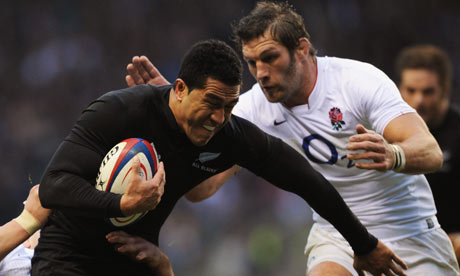
It is more than six hours since England scored a try against a team from the Tri-Nations and 85% of their points in those matches have come in the first half. They mustered a mere two penalties, both in the first half, against New Zealand and were unable to respond in any way when New Zealand raised the tempo in the third quarter.
New Zealand changed their game at the start of the second half. Having moved the ball wide before the break, they opted for the single pass and the drive through the middle or down the blind side where they looked to expose Matt Banahan's defence and it was in the Bath wing's channel that they scored their try. England, in contrast, manage a gear change only when they swap white jerseys for puce.
"We have to look at our fitness in terms of coming out of the blocks after half-time," said the England second- row Simon Shaw. "We gave it our all and restored some pride. A lot came out of the performance and it was a step forward but we knew that New Zealand traditionally look to dominate in the third quarter and it was then that they went away from us."
It was an atypical modern international in that there was little aerial ping-pong. England kicked the ball out of hand on 28 occasions compared to New Zealand's 26 while the All Blacks made 112 passes with England supplying 75. The difference lay in the variation: while England passed and kicked virtually an equal amount in each half, New Zealand made twice as many passes in the first half as they did after the break, moving England's big forwards around initially and then sapping their strength with close-quarter drives.
"We put New Zealand under pressure, particularly in the first half but we could not finish moves off," said the flanker James Haskell. "People who said in the week that we were in dire straits were talking rubbish. We have the players and the ability and we have to keep hacking away at it. We need to be united and ruthless if we want to start winning close matches, coming out of our shells and playing with control under fire. When we get injured players back, we should quickly get on to a roll."
Another difference between the sides was at outside-half. England went for a boshing midfield, unwilling to kick too often to a back three dangerous on the counter-attack. Jonny Wilkinson stood deep and, while his match statistics are identical to Dan Carter's in two respects, they both kicked or chipped on 10 occasions and gave 10 passes, Carter, adopting a flatter position, made seven breaks compared with Wilkinson's one."We won some good ball but we could just not get over the whitewash," said the flanker, Lewis Moody. "We had one goal in mind and that was to put them under as much pressure as we could: there was no way we were going to let them play the game they wanted. The forwards thought they could turn up and let their backs run around, but that was never going to be the case and they realised in the second-half that they had to work hard for victory. In the end, they were more clinical than us, not fitter."
England showed the defiance of a side that had taken a battering in the media, but the question going forward is whether they can draw inspiration from themselves rather than critics. "We showed how tight a group we are and, when you have that as a foundation, you can go far," said the England captain, Steve Borthwick. "We can be proud of our efforts but we lost the game because we were not good enough. We have come a long way in the 12 months in a year under Martin Johnson and we'll continue to get better."

